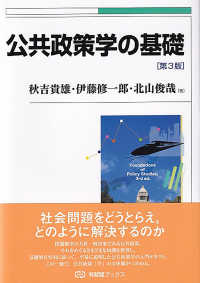- ホーム
- > 洋書
- > 英文書
- > Psychology
Full Description
Sentence First, Arguments Afterward collects the most important papers of Lila Gleitman's career, spanning over 50 years of work. These papers explore the nature of linguistic knowledge in children and adults by asking how children acquire language, how language and thought are related, the nature of concepts, and the role of syntax in shaping the direction of word learning. With an exclusive foreword by Noam Chomsky and an essay by Jeffrey Lidz contextualizing Gleitman's work in the emergence of the field of cognitive science, this book promises to be valuable both for its historical perspective on language and its acquisition and for the lessons it offers to current practitioners.
Contents
Section I. PRELIMINARIES
Foreword by Noam Chomsky
Chapter 1. From Structuralism to Cognitive Science: Lila R. Gleitman's Contributions to Language and Cognition, Jeffrey Lidz
Section II. WHAT DO THEY KNOW AND WHEN DID THEY KNOW IT?
Chapter 2. The Impossibility of Language Acquisition (And How They Do It), Lila R. Gleitman, Mark Y. Liberman, Cynthia A. McLemore, and Barbara H. Partee
Chapter 3. A Study in the Acquisition of Language: Free Responses to Commands, Elizabeth F. Shipley, Carlota S. Smith, and Lila R. Gleitman
Chapter 4. The Emergence of the Child as Grammarian, Lila R. Gleitman, Henry Gleitman, and Elizabeth F. Shipley
Chapter 5. Language Use and Language Judgment, Henry Gleitman and Lila R. Gleitman
Section III. WHERE DOES LANGUAGE KNOWLEDGE COME FROM? INPUT AND INNATENESS
Chapter 6. Mother, I'd Rather Do It Myself: Some Effects and Non-Effects of Maternal Speech Style, Elissa L. Newport, Henry Gleitman, and Lila R. Gleitman
Chapter 7. Beyond Herodotus: The Creation of Language by Linguistically Deprived Deaf Children, Heidi Feldman, Susan Goldin-Meadow, and Lila R. Gleitman
Chapter 8. Every Child an Isolate: Nature's Experiments in Language Learning, Lila R. Gleitman and Barbara Landau
Section IV. HARD WORDS AND SYNTACTIC BOOTSTRAPPING A: ESTABLISHING PLAUSIBILITY
Chapter 9. Structural Sources of Verb Learning, Lila R. Gleitman
Chapter 10. On the Semantic Content of Subcategorization Frames, Cynthia Fisher, Lila R. Gleitman, and Henry Gleitman
Chapter 11. Human Simulations of Vocabulary Learning, Jane Gillette, Lila R. Gleitman, Henry Gleitman, and Anne Lederer
Section V. HARD WORDS AND SYNTACTIC BOOTSTRAPPING B: BUT IS IT TRUE?
Chapter 12. Understanding How Input Matters: Verb Learning and the Footprint of Universal Grammar, Jeffrey Lidz, Lila R. Gleitman, and Henry Gleitman
Chapter 13. Hard Words, Lila R. Gleitman, Kimberly Cassidy, Anna Papafragou, Rebecca Nappa, and John C. Trueswell
Chapter 14. When We Think About Thinking: The Acquisition of Belief Verbs, Anna Papafragou, Kimberly Cassidy, and Lila R. Gleitman
Section VI. EASY WORDS? NOT SO EASY
Chapter 15. How Words Are (and Are Not) Learned by Observation, Tamara N. Medina, John C. Trueswell, Jesse Snedeker, and Lila R. Gleitman
Chapter 16. Propose But Verify: Fast Mapping Meets Cross-Situational Word Learning, John C. Trueswell, Tamara N. Medina, Alon Hafri, and Lila R. Gleitman
Chapter 17. Quality of Input Predicts Child Vocabulary Three Years Later, Erica A. Cartmill, Benjamin F. Armstrong III, Lila R. Gleitman, Susan Goldin-Meadow, Tamara N. Medina, and John C. Trueswell
Chapter 18. The Easy Words: Reference Resolution in a Malevolent Referent World, Lila R. Gleitman and John C. Trueswell
Section VII. WORDS AND CONCEPTS
Chapter 19. What Some Concepts Might Not Be, Sharon Armstrong, Lila R. Gleitman, and Henry Gleitman
Chapter 20. Why Stereotypes Aren't Even Good Defaults, Andrew C. Connolly, Jerry A. Fodor, Lila R. Gleitman, and Henry Gleitman
Chapter 21. "Similar" and Similar Concepts, Lila R. Gleitman, Henry Gleitman, Carol Miller, and Ruth Ostrin
Chapter 22. The Emergence of the Formal Category "Symmetry" in a New Sign Language, Lila R. Gleitman, Ann Senghas, Molly Flaherty, Marie Coppola, and Susan Goldin-Meadow
Chapter 23. Turning the Tables: Spatial Language and Spatial Reasoning, Peggy Li and Lila R. Gleitman
Chapter 24. Relations Between Language and Thought, Lila R. Gleitman and Anna Papafragou








